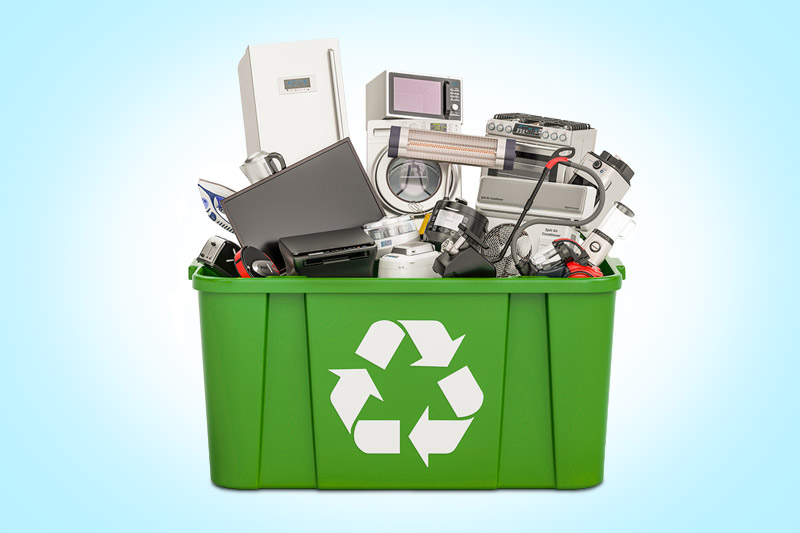Eco-Friendly Electronic Devices Recycling Solutions: Depend On the R2 Certification Criterion
Eco-Friendly Electronic Devices Recycling Solutions: Depend On the R2 Certification Criterion
Blog Article
Elevate Your E-Waste Management With R2 Qualification: a Thorough Introduction
In the realm of liable digital waste management, the value of carrying out effective strategies can not be overemphasized. As technology swiftly progresses, the need for correct disposal and recycling of electronic tools has come to be progressively crucial. One trick technique to boost e-waste monitoring methods is by acquiring R2 accreditation. This qualification stands as a hallmark of excellence in the area, signifying adherence to rigid criteria that make sure ecologically sound techniques. By exploring the processes and advantages related to R2 accreditation, a much deeper understanding of just how it can reinvent e-waste monitoring methods arises, clarifying a path in the direction of sustainability and ethical disposal methods.
Importance of E-Waste Administration

When e-waste is not handled appropriately, these harmful materials can seep right into the ecosystem, triggering injury to wildlife and potentially getting in the food chain, positioning threats to human health. Moreover, the inappropriate disposal of e-waste contributes to contamination and greenhouse gas emissions, intensifying environment adjustment and ecological deterioration.

Advantages of R2 Certification

To start with, R2 certification boosts reliability by showcasing a company's dedication to sustainable techniques. It assures clients, companions, and stakeholders that the company sticks to rigorous standards for e-waste administration - r2 certification. This credibility can result in boosted trust and enhanced relationships with customers that focus on environmental responsibility
Second of all, R2 qualification aids mitigate dangers connected with inappropriate e-waste disposal. By following the strict guidelines established forth by the qualification, companies can minimize the likelihood of data breaches, environmental contamination, and lawful consequences. This aggressive strategy safeguards the firm's reputation and reduces prospective obligations.
Finally, R2 accreditation shows a dedication to environmental stewardship - r2 certification. By properly handling electronic waste with accredited processes, organizations contribute to the conservation of resources, decrease of air pollution, and promo of a round economic situation. This dedication not just benefits the atmosphere but also aligns with evolving customer assumptions for lasting service methods
R2 Accreditation Process Overview
Having actually developed the benefits of R2 certification in promoting reputation, threat reduction, and environmental stewardship, it is vital to now lay out the in-depth process associated with getting this qualification. The R2 accreditation process starts with a complete evaluation of the company's functional plans and procedures to ensure conformity with the R2 requirement. This initial analysis is important in identifying any type of gaps that require to be attended to before proceeding additionally.
Once the company's techniques straighten with the R2 basic needs, an independent third-party auditor conducts an on-site audit to review the implementation and performance of these techniques. This audit consists of a detailed review of documentation, interviews with staff, and physical assessments of centers to validate compliance.
Complying with a successful audit, the company obtains an accreditation choice based on the auditor's searchings for. If authorized, the company is approved R2 accreditation, showing its dedication to accountable e-waste monitoring. It is very important to keep in mind that preserving R2 accreditation requires ongoing conformity with the standard's demands and routine audits to guarantee continued adherence to best techniques in e-waste recycling and disposal.
Key Standards for R2 Compliance
An important element of attaining R2 compliance is guaranteeing that all digital waste (e-waste) handling centers fulfill stringent environmental and security criteria. To adhere to R2 needs, organizations need to stick to key criteria that concentrate on accountable e-waste monitoring techniques. These standards consist of implementing a documented environmental, health, and safety administration system, making sure the safe handling of data-containing gadgets, and performing detailed downstream due persistance to track the last location of e-waste products.
Additionally, R2 conformity requires the appropriate testing, refurbishment, and recycling of electronic tools to expand its valuable life and decrease ecological effect. Facilities seeking R2 certification must also focus on employee health and wellness and Resources security by offering required training, personal safety devices, and a risk-free working setting. In addition, preserving comprehensive records of e-waste handling activities and on a regular basis going through audits by certified certifying bodies are essential elements of demonstrating ongoing conformity with R2 standards.
Influences of Lasting E-Waste Practices
The implementation of sustainable e-waste methods according to R2 conformity not just ensures environmental and security standards are met yet also substantially influences the total lifecycle of digital items. By adhering to R2 requirements, electronic waste go now administration procedures come to be more efficient, lowering the ecological footprint of digital items. Sustainable e-waste practices assist in the proper disposal of digital components, making sure that hazardous products are handled sensibly and do not end up contaminating the environment.
In addition, embracing sustainable e-waste techniques promotes the round economic situation by helping with the recuperation and reuse of important products from digital products. This not only saves precious resources however additionally reduces the requirement for resources removal, reducing the ecological influence of digital production. Furthermore, lasting e-waste techniques can contribute to job development in the recycling and repair fields, fostering economic growth while advertising ecological duty. Overall, the adoption of sustainable e-waste methods under R2 accreditation acts as a crucial step towards accomplishing a much more eco lasting electronic devices sector.
Conclusion
To conclude, implementing correct e-waste monitoring methods is vital for environmental sustainability and resource conservation. R2 qualification plays a crucial function article source in making sure accountable handling and disposal of electronic waste. By sticking to the rigid requirements stated by R2 criteria, companies can not only minimize their ecological effect but additionally add to a more lasting future for generations to find.
One key technique to raise e-waste management practices is by acquiring R2 accreditation. By discovering the processes and advantages connected with R2 accreditation, a deeper understanding of just how it can revolutionize e-waste monitoring approaches emerges, shedding light on a path in the direction of sustainability and moral disposal practices.
The R2 qualification procedure begins with a thorough evaluation of the organization's operational plans and procedures to make certain compliance with the R2 criterion. If approved, the company is granted R2 accreditation, demonstrating its commitment to liable e-waste management. Generally, the adoption of sustainable e-waste techniques under R2 certification offers as an essential action in the direction of achieving a much more eco sustainable electronic devices sector.
Report this page